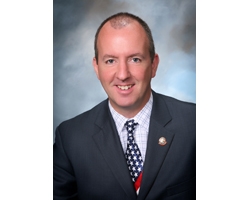Mayor Mehaul O’Leary is an example of the American dream. He’s an Irish immigrant who has been a Culver City resident for 18 years and a successful Culver City business owner for the past 12. O’Leary, owner of “Joxer Daly’s,” became a United States citizen in 2003, within a year, he was doing everything required to run for city council. He lost his first campaign in 2006 running against incumbent Gary Silbiger and Scott Malsin for one of the two seats available. He came back in 2008 to win one of the three seats available against a staggering eight candidates running.
It is from his desire to see Culver City get a firm footing toward financial stability that Mehaul O’Leary seeks re-election to City Council. O’Leary currently serves on the Culver City City Council as mayor. Although the position of vice mayor in the Culver City City Council is rotational, the position of mayor is decided by a council member vote. The Culver City mayor’s position is a one-year term and is considered ceremonial; the main function is of running the council meetings. However, the mayor does get the last word and the deciding vote in matters where the council is in a deadlock.
“As a small business owner, I understand the importance of controlling spending and balancing a budget. In my first term I have done just that,” he says. “I will work hard and smart, providing fiscal responsibility and continue to protect our City its services and our quality of life.”
O’Leary is a declined-to-state registered voter, which means he is not beholden to any political party. He feels that this enables him to steer clear of party politics and stay focused on protecting Culver City’s interests. In the position of mayor, O’Leary believes bringing either side towards the other on divisive issues is much more democratic and in the long run effective.
This was clear when it came to the issue of whether or not Culver City was going to have an Animal Control Officer. The city council was split on the matter. O’Leary felt strongly that this was the right thing to do. But before having the final word, which would have initiated the program and created animosity between council members, he suggested a pilot program. With that compromise, earned the support of every member of the council, and the entire council agrees that the pilot program has been a success and that a full-time Animal Control Officer is a benefit to Culver City.
“A torn council does not benefit the city,” he says. “In the long run, nobody remembers whether or not it was a Republican idea or a Democrat idea. They just want the job done. That’s why you’ve been voted into office: to work together for the overall good of the city.”
O’Leary is on numerous regional bodies, including the Santa Monica Bay Restoration Commission, the Expo Line, and the League of California Cities. “We are not an island,” he says of Culver City. He is adamant that our leaders need to be involved outside of our community as well, in order to maintain a healthy dialogue with Los Angeles so that Culver City doesn’t end up without control of development along its borders.
O’Leary is very determined to protect Culver City’s land-holdings, which include Parcel B, the triangular parcel in front of the Culver Hotel and Culver Studios, and the plot at National Boulevard Train Station between Washington Boulevard and Venice Boulevard. These areas were purchased with funding from the city’s redevelopment agency, and locking in third parties like the Metro before the February first deadline as established by AB 26, should protect the State from taking them. O’Leary is clear to point out that Culver City has successfully managed its redevelopment funding and was already in the process of budgeting itself off the program.
The waiving of the film permit fees is another issue that the Mayor was instrumental in passing.
“We are the ‘Heart of Screenland,” he points out, “and nobody was filming here because our permit fees were astronomical.”
He cast his vote with the other members of city council to have all film permit fees waived for five years. Now into its second year, the increase in residual monies spent in Culver City to support the filming is substantial enough for O’Leary to predict that this measure will be easily renewed.
He was quick to point out that the new parking meters will be set to cut off at 6 p.m. and will be free on Sundays in downtown Culver City, which was how the older ones were previously set. The council is quickly correcting an oversight that had them running until 8 p.m., seven days a week.
“The city needs to meet a budget, and it will not meet it by discouraging tourists with the burden of constantly being concerned about feeding the meters,” he says.
The future of Culver City is O’Leary’s passion, and he believes that the future is in the hands of the city’s children. He never turns down an opportunity to talk with children at our city’s schools. Mehaul lights up when he speaks of the letters he has received from children thanking him after talking at their school, and for specifically letting them know that the American dream is still alive and that they too can achieve it. The mayor is also very supportive of volunteering.
“Not as mayor, but as a private citizen, I support the role of volunteers and parent-aided services across Culver City Unified School District, and I urge the board to protect this position to the best of their ability,” he said recently at the El Marino Language School.
When it comes to the future of Culver City, a council of leaders working together for the greater good of the community is top priority for O’Leary.
Election day is April 10.

